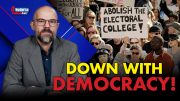
The love of liberty is not exclusive to the United States.
Evidence of the universality of the “yearning to be free” is found in the enthusiastic reception given to former congressman Ron Paul at an appearance in Santiago, Chile.
The libertarian icon was in Chile’s capital city as part of the annual “Sovereign Man” conference.
According to the event’s organizer Simon Black (an alias), the philosophy informing the meeting is the belief that “in order to achieve true freedom, you have to be able to make money, control your time, and eliminate the mindset that you are subject to a corrupt government that is bent on degrading your personal liberty.”
Sounds like something right up Ron Paul’s alley.
Economic Policy Journal reported that Paul answered the roar of the crowd, declaring, “It sounds like the revolution has gone international!”
Paul’s speech focused on issues of financial freedom.
Based on tweets posted by Jim Rickards, Paul’s message was well-received and consistent with his pro-liberty position.
As reported by Economic Policy Journal’s summary of Rickards’ tweets, Paul said, “The same thing will happen to the Federal Reserve as happened to the Soviet Union.” “The handwriting’s on the wall; the system is failing.”
Ron Paul’s campaign to force the Fed to submit to the will of the people and their elected representatives is renowned.
As recounted on RonPaul.com:
For the past 30 years, Congressman Ron Paul has worked tirelessly to bring much-needed transparency and accountability to the secretive bank. And in 2009 and 2010 his unfaltering dedication showed astonishing results: HR 1207, the bill to audit the Federal Reserve, swept the country and made the central bankers shudder at their desks. The bill passed as an amendment both in the House Financial Services Committee and in the House itself.
Then, in 2012, his final year in the House, Congressman Ron Paul reintroduced the Audit the Fed bill (H.R. 459), which passed the House 327-98.
How has the Federal Reserve done so much damage to the economy?
First, the unelected governors of the unconstitutional central bank have an absolute stranglehold and monopoly over the flow of our nation’s money and credit. Not once since its inception in 1913 has there ever been a thorough audit or an accounting to Congress about its activities.
During its century-long reign over the financial well-being of our country, the Federal Reserve has inflated our currency to the point where, compared to 100 years ago, it is nearly worthless. Meanwhile Congress has turned a blind eye and a deaf ear to the crisis and the calls to control it.
Since the Federal Reserve’s inception in 1913, the dollar has lost over 95 percent of its purchasing power. Most, if not all, of this precipitous decline was caused by the mindless monetary policy of the Federal Reserve.
The United States of America has been driven to the very edge of a devastating fiscal cliff by the folly of the Federal Reserve and the abdication of its authority by an impotent Congress. Together, these factors add up to $14 trillion in ill-conceived loans and federal bailouts and a crushing national debt of over $16 trillion.
Adding insult to injury, during testimony to Congress in 2009, Federal Reserve Chairman Ben Bernanke refused to reveal to committee members the names of the institutions that received trillions of dollars from the Fed. Later, he told our elected representatives that he would not disclose the identity of the foreign banks that were parties to sweetheart deals with the Federal Reserve.
Turning his sights on one of the most unconstitutional and destructive agents of federal economic tyranny, Ron Paul reportedly called for the abolishment of the IRS.
“People in Washington say we need to sacrifice. I say abolish the IRS. That’s not a sacrifice, it’s a gift!” Paul reportedly declared.
As with his criticism of the Federal Reserve, Ron Paul’s ire regarding the IRS is nothing new.
In a November 20, 2008 interview in the New York Times, Paul said, “I want to abolish the income tax, but I don’t want to replace it with anything. About 45 percent of all federal revenue comes from the personal income tax. That means that about 55 percent — over half of all revenue — comes from other sources, like excise taxes, fees, and corporate taxes.”
On May 7, 2001, Ron Paul published the “case against the income tax.” He wrote:
Could America exist without an income tax? The idea seems radical, yet in truth America did just fine without a federal income tax for the first 126 years of its history.
Prior to 1913, the government operated with revenues raised through tariffs, excise taxes, and property taxes, without ever touching a worker’s paycheck. In the late 1800s, when Congress first attempted to impose an income tax, the notion of taxing a citizen’s hard work was considered radical! Public outcry ensued; more importantly, the Supreme Court ruled the income tax unconstitutional. Only with passage of the 16th Amendment did Congress gain the ability to tax the productive endeavors of its citizens.
Yet don’t we need an income tax to fund the important functions of the federal government? You may be surprised to know that the income tax accounts for only approximately one-third of federal revenue. Only 10 years ago, the federal budget was roughly one-third less than it is today. Surely we could find ways to cut spending back to 1990 levels, especially when the Treasury has single year tax surpluses for the past several years. So perhaps the idea of an America without an income tax is not so radical after all.
The harmful effects of the income tax are obvious. First and foremost, it has enabled government to expand far beyond its proper constitutional limits, regulating virtually every aspect of our lives. It has given government a claim on our lives and work, destroying our privacy in the process. It takes billions of dollars out of the legitimate private economy, with most Americans giving more than a third of everything they make to the federal government. This economic drain destroys jobs and penalizes productive behavior. The ridiculous complexity of the tax laws makes compliance a nightmare for both individuals and businesses. All things considered, our Founders would be dismayed by the income tax mess and the tragic loss of liberty which results.
Rickards reported that Ron Paul’s Santiago speech ran 20 minutes over, but “no one minded at all. The audience hung on every word.”
Americans and proponents of liberty around the world can read Ron Paul’s insightful and inimitable take on threats to freedom in his weekly “Texas Straight Talk” column.
Joe A. Wolverton, II, J.D. is a correspondent for The New American and travels frequently nationwide speaking on topics of nullification, the NDAA, and the surveillance state. He can be reached at [email protected].



